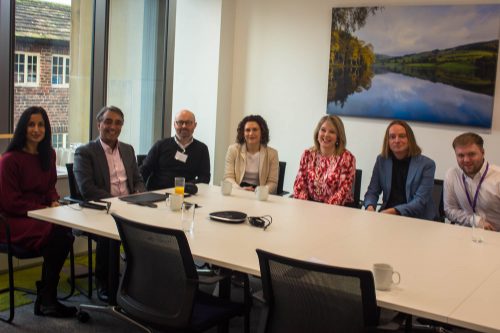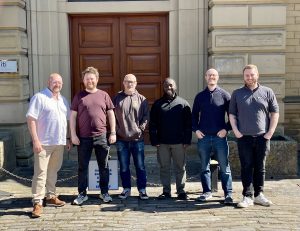The risks of AI – and how to mitigate them

For all the excitement AI is generating in the C-Suite, there are risks to adopting new technology.
The business leaders at our Impact of Technology round table, sponsored by Grant Thornton and hosted at its Sheffield office, considered the ethics of AI, its impact on staff, and how to mitigate the risks posed by the technology.
Dan Kirkland, a non-executive director at Sheffield Chamber of Commerce and co-founder of social recruitment firm TribePad, highlighted a fundamental risk: that of data reliability.
“Your answer is only as good as the data that’s provided to create the answer, and that’s where the risks are with AI. There’s a saying in tech, garbage in, garbage out, and that is only going to be magnified with AI.
“I think we are going to trust AI to do more sooner rather than later, but it’s context. There are some things you are not going to want AI to do.”
Timing adoption
While several leaders in the discussion were already employing AI in day-to-day tasks, others took a more cautious approach.
Sue Grocutt, commercial director at the University of Sheffield, wanted to see the technology in action. “If you’re going to be a trailblazer, it’s very difficult,” she said. “It’s better, easier to be second.
“If there’s a large, complex organisation that does their finances through AI, we’ll look at it and what we could do, how it actually works, and how people interact with it – like you do with SAP systems.”
Emma Davies, partner at Grant Thornton, said, “The pace of change of technology is so fast. It’s got to be really small steps in the right direction for efficiencies and in automation, and to get our people to drive some of that. You can’t do everything all at once. If you take small steps, eventually you gain momentum and people see the benefits and you can make the change.”
Craig Finn, director at Henry Boot Construction, spoke of the need to constantly adopt and adapt.
“If you don’t do it, you’re going to be the only one who doesn’t in your industry,” he said. “If you’re ahead of the curve now, you’ve already got a benefit, but people will catch up. For every business this is a real tricky one. What’s good today, what’s giving you the edge, is gone tomorrow.”
Vijay Rathour, head of Grant Thornton’s cyber and digital investigations team, agreed. “If you’re not doing it and your competitors are, you’re not going to be around long to compete.”
Security
One area where AI poses a significant threat to businesses is its use by black-hat hackers to penetrate security.
Debbie Andrew, head of finance at Sheffield United FC, said, “We’re in the middle of the transfer window, and we typically see a massive spear phishing uplift. There’s a lot of money going on. Industry wide, there have been very public attacks where people have lost a lot of money.”
But Dan Kirkland, non-executive director of Sheffield Chamber of Commerce and a tech founder himself felt that AI could also serve as a useful defence. “AI is creating the problem, but AI is also the answer. Phishing is so sophisticated. They’re mimicking a child’s voice to make a call to the parent. The level of sophistication is going through the roof. But AI can help. There needs to be AI embedded in the network and the ISPs, monitoring and detecting this kind of stuff.”
Dr Sam Chapman, chief innovation officer at The Floow, agreed defensive AI was a necessary tool in cybersecurity. “You’re looking at competing AI systems that are busy fighting in the background, keeping what you see clean and safe for you to actually consume. If you don’t get engaged in that technology, you will be subject to attack from it, because it’s happening and it’s happening everywhere.”
Matt Travis, of environmental consultancy Enzygo, said his firm was already using such a product that checked computer usage against expected usage. “It will ask why a sheet is trying to download something from the internet, or run a macro. Why is this software doing something? It learns different tools, and it’s very powerful to stop those sorts of attacks.”
Ethics and AI
How to use AI ethically, and who had responsibility for that, sparked much discussion among the attendees.
Emma Davies, partner at Grant Thornton, said, “In our business ethics is top priority across everything that we do. So as we start to use AI more in all of our everyday processes, you’re never going to not need humans to challenge the outputs and sense check that we’re doing the right thing, because we must always do the right thing. And I can’t see a world where AI is going to be that sophisticated to ever take away that human judgment.”
Dr Chapman agreed, “Every tool, every process you have within a business has to be considered from an ethics process and AI is no different. The data it uses the decisions that it makes, you also have to sensibly sanity check, because you need to make sure that it’s not making a judgment that you wouldn’t have made. So there’s still the need to do something in the traditional human manner in terms of actually is that output, right? Is it unbiased? Is it fair? Is it doing the right thing? Is it using fields of data that we should be using?”
Vijay Rathour said ethical considerations would always be balanced with commercial concerns.
“If you look at any business where we are the product, and they’re advertising to us, isn’t it great to know everybody’s data? They’ve gone through the ethical considerations and said, ‘Well, I’ve now profiled Vijay’s tastes and favourites, and I know that I can make more money off him by showing him Japanese cartoons.’”
But commercial interests could go too far, he noted. “If you’ve got a Cambridge Analytica and somebody can make a penny on your data, they probably will, even going as far as using AI and technology to shape our opinions, politics and business strategies. And at what point do we spot it? So you do need more intensive and increasing regulation and so forth.”
This is the second of two reports from the Impact of Technology round table. The first examined the different ways leaders use – or plan to use – AI in their businesses.









